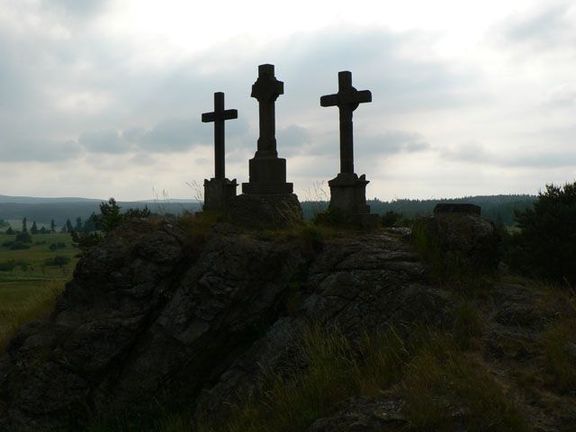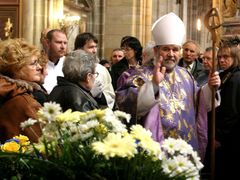Prague - Dressed smartly in suits and power ties, Alex Trost and Ryan Mack approach a woman drinking coffee at a busy, outdoor café in Prague's Old Town. Smiling determinedly, they greet her and proceed to ask if she has ever read the Book of Mormon.
Though this might be a common scene in the United States, what makes this situation different is that the entire conversation is in Czech, in a country on the other side of the world from the boys' hometowns. Trost and Mack were both typical 21-year-old college students before they decided to dedicate two years of their lives to being Mormon missionaries in the Czech Republic.
But along with the difficulties of learning a new language and adapting to a new culture, an even greater obstacle that they and in fact all religious missionaries in the Czech Republic face is finding people to listen.
In a 2007 survey conducted by the STEM polling agency, 48 percent of Czech respondents identified themselves as atheists, making the country home to the highest percentage of atheists in Europe, if not the world.
It is no wonder that the Czech Republic presents a difficult working environment for missionaries such as Trost and Mack.
"I would say that Czechs do not like to talk about religion too much," said Petr Mucha, a professor of religious studies at New York University in Prague. "A lot of it comes from the education under communism. They were taught that religion was bad and led to bad results."
These bad results, according to the communist doctrine, included the domination of Habsburg Empire, which backed by the Catholic Church, squelched Czechoslovak aspirations during its rule from the mid-16th century until World War I.
Fifty-five percent of Czechs mistrust all churches and only 28 percent trust them, according to the STEM poll.
"I try to talk to people about faith and how it has helped me in my life and it is sometimes difficult because these people don't have a history of faith," said Mack. "They have had some rough times during world wars and communism, so it's hard for them to believe in something they don't see. Even though I'm speaking their language, they are afraid to trust me at first. I have to gain their trust."
Mack does not seem to consider, however, that with or without religion, many people find the whole idea of missionaries offensive.
Tomas Uher is a Protestant evangelist who is a Czech native and works for the U.K.-based International Fellowship of Evangelical Students (IFES), which targets Czech university students. He finds that even coming from the same cultural background as his audience, he still faces the same trust issues as the Mormon missionaries.
"The general response I receive is suspicion," said Uher. "So I've found the best way to reach people is through relationships. I heard it once said that it takes a Czech student an average of one and a half years to two years to convert to Christianity and I've found this to be true. Friendship is the main vehicle."
Despite the discouraging statistics, people from various religious organizations dedicate years, some even entire lifetimes, to bringing spiritual awareness to Czechs.
The Mormon Missions make up one of the biggest evangelistic movements in Central Europe, with 18 branches in the Czech Republic and Slovakia and a team of 88 full-time missionaries staffing them. Mormons, who are perhaps most notorious for their historical support of polygamy as well as their strict abstinence from alcohol and caffeine, are a common sight on the streets of all the region's major cities. (The church now prohibits polygamy, excommunicating any members found to be practicing it.)
"Sometimes they'll be walking on the streets or they'll be out on the namestis (squares) where we see them on a regular basis," said Marvin Slovacek, president of the Mormon Missions in Prague, explaining the missionaries' work. "They'll be going through the apartment houses knocking on doors, wanting to talk to people about what those people believe and what's important to them, and offering to share our beliefs with them."
Perhaps the most controversial religious practitioners in Prague are the followers of the Hare Krishna, the Gaudiya Vaisnavas. Sometimes considered a cult, the Hare Krishnas, as they are dubbed, are known for their loud parades of chanting and dancing in orange, toga-like outfits through the main streets of Czech cities.
"We have found peace and want to share that enlightenment with others," said Rama Goswami, a a Gaudiya Vaisnava staff member at the International Society for Krishna Consciousness (ISKCON) center in Prague. "This is our way of showing people how happy and satisfied with life we are," he said of the parades. "We want them to have it too."
Practitioners of Krishna consciousness like Goswami believe in in a god, Krishna, who serves as all-Gods-in-one. Their philosophy is rooted in several Hindu texts, including the Bhagavad-gita, and see spiritual enlightenment in the form of a higher consciousness and pure love of Krishna as their goal in life.
However, partially due to the evangelistic nature of their religion, members of the Hare Krishna movement have been troubled by accusations of cult-like behavior.
Centers in the United States have been forced to pay settlements to many people after cases involving child abuse, brainwashing, and racketeering. These range from a 1976 brainwashing case, eventually settled for $485,000, to a massive 2005 lawsuit brought by 95 alleged victims of child abuse, who settled for $9.5 million dollars and caused the centers involved in the proceedings to declare bankruptcy in the process.
Though none of these incidents happened in the Czech Republic, they still affect the Czech (and worldwide) image of the religion.
In Prague, the Hare Krishna operate a small center, offering such programs as a weekly vegetarian dinner, classes for those who would like to become devotees of the religion, and inter-religious dialogues. They also distribute over 100,000 books of philosophical texts each year to passersby on the streets of cities all around the Czech Republic.
Some Czechs appreciate the efforts religious missionaries are making to share their beliefs.
"I'm not interested in spirituality right now, but it doesn't hurt to listen," said Charles University med student Jana Slovacek. "If anything, I admire their courage to go and talk to random people like they do. I couldn't do it."
Others find their tactics pushy and degrading.
"Why should I listen to them?" said Pava Urban, a librarian working in Prague. "What gives them the right to try to trick me into believing what they do through free dinners and movies? I'm not stupid. I know what they are trying to do."
Meanwhile, the idea of religion may be losing some of its negative connotations in the Czech Republic.
"The number of Czechs identifying with a specific religion is on the rise," said Mucha. "All I can say is that my parents' generation was certain that in the future, religion would be less and less a part of current events, and present day shows the complete opposite. If anything, seeing how important a role religion plays in world events is at least making Czechs more interested in learning more about religion."
This story was originally published by the Prague Wanderer, a web-zine run by New York University students in Prague, Czech Republic.
Jessica Shim is a fourth-year student at New York University, studying broadcast journalism, international politics, and East Asian studies. She is from Potomac, Maryland.








